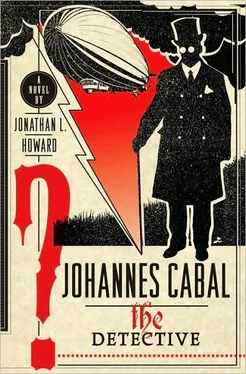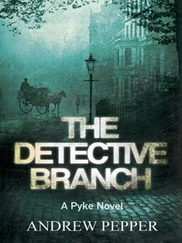She smiled, as if making small talk, but her voice was cold. “Because they’d have taken you back to Krenz and strung you up. That’s if they didn’t throw you overboard here and now. Your breed isn’t popular among the Mirkarvians.” His gaze slid to look at her. “Or anywhere,” she added with a certain emphasis.
Cabal narrowed his eyes, nettled. “So you’re preserving my life for humanitarian reasons. How very kind of you. I feel redeemed already.” She still had the power to send him to his death but, somehow, that was preferable to being patronised.
“Save your sarcasm, Cabal. When we reach Senza, I’ll see you put under arrest. They don’t have capital punishment for the likes of you. It will be life imprisonment, but that’s no more than you deserve.” She spoke with a cold certainty.
Cabal wished he had a drink, just to give his hands something to do. Currently, they were keen on carrying out Plan A, and damn the consequences. “You’re your father’s daughter,” Cabal said finally. “Speaking of whom, how is he?”
“As well as can be expected after what you put us through.”
“I don’t suppose your opinion of me would be moderated at all if — ”
“No.”
“ If I told you I was hardly a free agent.” He looked at her. “No, I don’t suppose it would. Not in your little world of moral certainties.”
“You really do think that you’re superior to everybody else, don’t you?”
“Don’t be absurd,” he answered, while trying hard to think of somebody he looked up to. There didn’t seem to be anybody.
They stood in awkward silence for a few moments. “So,” said Cabal, fractionally less irritated by the presence of words than by their absence. “What brought you to a pit like Mirkarvia?”
“My degree,” replied Miss Barrow, grudgingly. She volunteered no more.
“Your degree? What sort of degree, precisely?”
“Criminal psychology,” she replied, and looked squarely at him.
Cabal sighed. “You really are your father’s daughter. What is your intended career? A plodding police officer, or the proprietor of an asylum for the criminally insane? I’d suggest you plump for the latter; the hours are better.”
In reply, she simply tilted her head and looked more keenly at him. It was a look that, he realised, closely mirrored his own when a likely corpse happened his way. Usually under a tarpaulin on the back of a cart at three in the morning.
“Tchah,” he tutted. “You think I’m a criminal, don’t you? One of your grubby little perpetrators from a troubled family background who commits outrages because a cousin told him horses have five legs when he was an infant and it scarred him for life. Is that it?”
“You are a criminal, Cabal. But there’s nothing common or garden about you. Do you know I decided on taking this degree in the first place after meeting you?”
Cabal frowned. “If you’re trying to endear yourself to me, you’ve chosen an odd way of setting about it.”
“Your behaviour was criminal, but your motivation … I didn’t understand your motivation at all. Most of your colleagues — ”
“I don’t have colleagues. It is not a profession that encourages union activity or glee clubs.”
“ — are a bunch of shallow megalomaniacs. They’re easy — I can spot a power-crazy, corpse-raising nutcase — ”
“Ah, now you’re trying to lose me with jargon.”
“Stop interrupting me. I can spot one of those pathetic creatures at ten paces.”
“You must have met dozens,” muttered Cabal.
“I’ve met a couple,” she said. Cabal looked at her with surprise. Having secured his attention for the moment, she continued more sedately. “In an asylum for the criminally insane, as it happens. Sad, lonely men, they took up necromancy in the same way madmen might take up knives to revenge themselves on a society that they don’t understand and that makes no effort to understand them. You, though. You can fit in. It’s no mean feat to pass yourself off as one of this bunch.” She indicated the gathered Mirkarvians with a nod of her head. “I don’t see you leading an army of zombies into the fray.”
“Zombies are so passé.”
“Don’t be flippant with me, Cabal. Your life’s mine. I want to do the right thing but, my God, it wouldn’t take much provocation — not much at all.”
Cabal scowled. “What’s this? Psychoanalysis by coercion? ‘Tell me about your childhood, or else?’ I didn’t realise psychiatry had become so two-fisted.” He smiled at her for appearance’s sake, but his eyes were sharp and dangerous. “Don’t think you can quantify me and put me in a thesis. A census taker once tried to test me. I let my front garden eat him.”
“Your front garden?”
He wrinkled his nose. “You didn’t expect me to do it, did you?”
Miss Barrow’s eyes flickered to one side, and suddenly she smiled broadly and became the very spirit of vivacity. “You told your gardener he could eat it! Oh! That’s simply too precious!” She laughed full-throatedly.
Cabal was caught off guard, but only for a moment. He looked to his side and pretended to realise that they had company. “Well,” he said with ersatz joviality, “you just can’t get the staff these days, can you?”
The couple to whom he spoke allowed a moment’s bewilderment before laughing politely. “No, no, you can’t,” said the man, plainly wondering with what he was agreeing.
There was a short embarrassed pause during which Cabal wondered why they wouldn’t go away, and the couple desperately tried to formulate a polite plan for getting away.
“I’m Roborovski,” said the man, having run out of ideas. “Linus Roborovski. And this is my wife, Lisabet.”
They did not seem to be especially well suited to each other. He was in his late thirties to mid-forties, careworn and starting to bald, and he exuded an air of being in a state of permanent harassment. He wore a good, but not very good, bespoke suit in brown-green twill which he looked forced into despite its having been made to measure. Cabal decided that he was a small businessman who had unexpectedly become successful and wasn’t quite sure how to deal with the trimmings that came with it.
His wife had a good six inches on him and was younger, no more than thirty. She was wan rather than simply pale, and she wore her loosely coiled strawberry-blond hair like an affliction. She had an unlovely dress in mustard yellow hanging about her that in no way complimented her complexion. She stood beside and a little behind her husband, and they looked like the makings of a poultice. They served to remind Cabal — should a reminder ever be necessary — why his social skills were so poor: people were loathsome and not worth the practise.
“Meissner,” he said, shaking hands with Roborovski. “Gerhard Meissner.” He hadn’t even let Roborovski’s hand go before his wife was offering hers, palm down. Hoping he successfully suppressed the weary note that would surely colour his voice should he let it, he clicked his heels and kissed her hand. “ Enchanté ,” he added, for want of anything sensible to say. In his experience, it was possible to talk any sort of rubbish in a foreign language and so sound sophisticated.
As he looked up in straightening, he noticed a glimmer in her eye that he didn’t altogether like. There was something calculating there, and the fact that he had no idea what she was calculating caused him a twinge to his sense of self-preservation. In an instant, the glimmer was gone and she was looking at him with the glassy expression of a bourgeois hausfrau, or a head of livestock.
Herr Roborovski was looking enquiringly at Miss Barrow. “And your friend is …?” he asked Cabal.
Читать дальше











